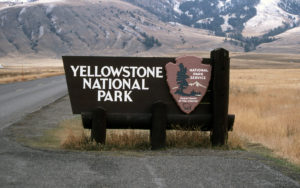
To protect bears and increase visitor safety, Yellowstone National Park will create a new bear management area (BMA) in Hayden Valley, which will prohibit off-trail travel July 15-Sept. 15. The park also decommissioned an existing BMA in the Firehole River area. Additionally, skiers observed the first grizzly bear of 2024 on March 3.
Changes to Two Bear Management Areas
Yellowstone is implementing a new 16,453-acre Hayden Valley BMA, located on the west side of the Grand Loop Road in Hayden Valley in the central part of the park. In this BMA, Mary Mountain Trail will remain open for recreational travel; however, off-trail travel will not be allowed from July 15-Sept. 15 each year.
Hayden Valley provides prime habitat for grizzly bears, especially during the summer when high concentrations of bears can be found scavenging on bison carcasses. Park biologists observed as many as 23 individual grizzly bears on a single bison carcass. Since 1970, eight of the last 10 grizzly bear-inflicted human injuries (bites to fatalities) in Hayden Valley occurred in the area that will be the Hayden Valley BMA.
To provide recreational opportunities, Yellowstone decommissioned the 20,670-acre Firehole BMA, located in the west side of the park, due to fewer ungulate carcasses and wildlife conflicts occurring in this area. By decommissioning the Firehole BMA, the public will have access to Midway Geyser Basin Overlook, Fairy Falls, and Mystic Falls trails, which were previously closed to all recreational access between March 10 and the Friday of Memorial Day weekend.
Yellowstone wildlife biologists establish BMA’s in locations where grizzly bears are known to seasonally concentrate because of a high density of elk and bison carcasses. In these areas, certain recreational activities may be limited at specific times of year to reduce encounters between bears and humans. Learn more about BMA’s at Bear Management.
First Grizzly Bear Sighting of 2024
On March 3, visitors skiing on the Specimen Ridge Trail in the north-central part of the park observed the first grizzly bear of 2024. The first bear sighting of 2023 occurred on March 7.
Male grizzlies come out of hibernation in early March. Females with cubs emerge in April and early May. When bears emerge from hibernation, they look for food and often feed on elk and bison that died over the winter. Bears will react aggressively to encounters with people when feeding on carcasses.
All of Yellowstone National Park is bear country: from the deepest backcountry to the boardwalks around Old Faithful.
Protect yourself and the bears people come here to enjoy by following these guidelines:
- Prepare for a bear encounter by carrying bear spray, knowing how to use it and making sure it’s accessible.
- Stay alert.
- Hike or ski in groups of three or more, stay on maintained trails and make noise. Avoid hiking at dusk, dawn or at night.
- Do not run if you encounter a bear.
- Stay 100 yards (91 m) away from black and grizzly bears. Approaching bears within 100 yards is prohibited. Use binoculars, a telescope or telephoto lens to get a closer look.
- Store food, garbage, barbecue grills and other attractants in hard-sided vehicles or bear-proof food storage boxes.
- Report bear sightings and encounters to a park ranger immediately.
- Learn more about bear safety.
Bear spray has proven effective in deterring bears defending cubs and food sources. It can also reduce the number of bears killed by people in self-defense. While firearms are allowed in the park, the discharge of a firearm by visitors is a violation of park regulations.
